The EU Artificial Intelligence Act (AI Act)
The AI Act is the first-ever legal framework on AI, which addresses the risks of AI and positions Europe to play a leading role globally.
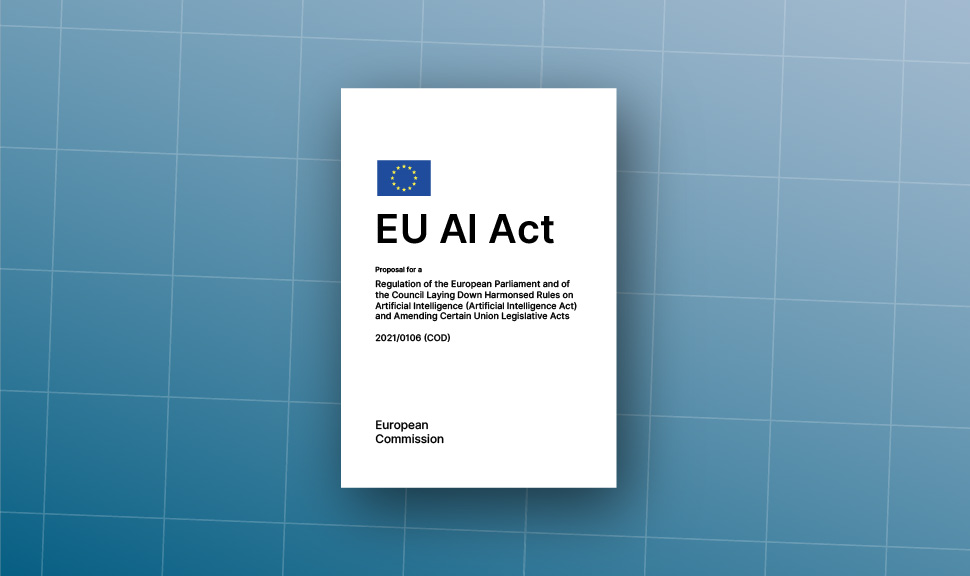
The AI Act is the first-ever legal framework on AI, which addresses the risks of AI and positions Europe to play a leading role globally.
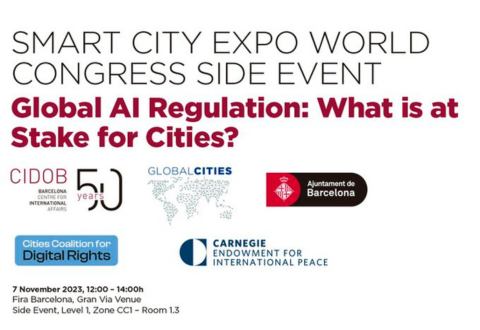
The session discussed the interplay between global and local AI governance efforts and present the first findings of the “Atlas of Urban AI” report (1st edition).
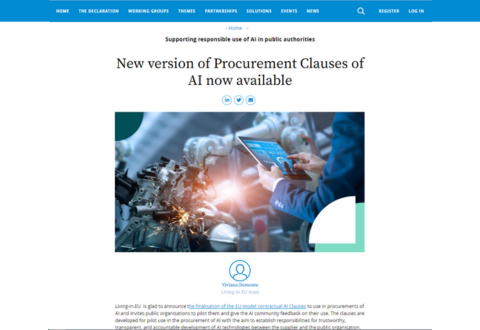
Living-in.EU is glad to announce the finalisation of the EU model contractual AI Clauses to use in procurements of AI and invites public organisations to pilot them and give the AI community feedback on their use. The clauses are developed for pilot use in the procurement of AI with the aim to establish responsibilities for trustworthy, transparent, and accountable development of AI technologies between the supplier and the public organisation.
This work has been supported by the Directorate-General for Communications Networks, Content and Technology (DG CNECT), the Directorate General for Internal Market, Industry, Entrepreneurship, and SMEs (DG GROW), Living-in.EU – an EU-funded project, supporting digital transformation of public authorities across Europe, and Pels Riicken, a Dutch legal firm.
This work has been organised in the context of Living-in.EU, in particular the Legal and Financial subgroup.

CIDOB’s Global Cities Programme with the support of the Barcelona City Council organises an international seminar on the dark side of AI with key stakeholders on 19th June 2023 (4:00-6:00 p.m.).
Artificial Intelligence has become one of the biggest hype topics of the year, also in the urban world. And not without good reason: AI is widely perceived as a valuable tool to address the most important challenges of our societies, including dealing with the climate emergency. The potential uses of AI applications are extensive and varied, ranging from enhancing resource usage efficiency, improving transportation and urban planning effectiveness, or providing more personalized urban services. AI is also the driving force behind the green and digital transition promoted by cities worldwide. Yet, while we tend to imagine the digital as something ethereal, limitless, dematerialised and neutral, there are significant social and environmental costs associated with the growing reliance of our societies on AI systems.
More info soon.
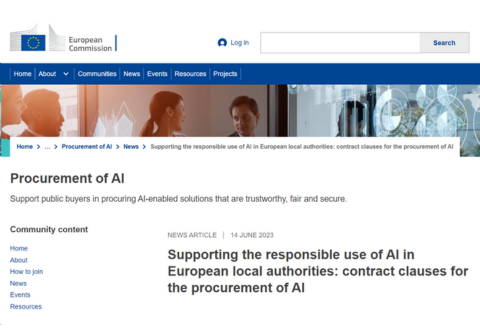
In the context of the Legal subgroup of Living-in.EU and in collaboration with DG GROW, two Roundtables on Procurement Clauses of AI have just been concluded. Organised by Eurocities in the context of Living-in.EU and led by the Dutch Law firm Pels Rijcken, the exercise aimed at peer review common procurement clauses on AI for local authorities.
Building on the good practice of the City of Amsterdam and considering the latest development of the European proposal for an Artificial Intelligence Act, the objective of the Roundtables has been to peer review the Procurement clauses developed by Amsterdam and draft a standard for public procurement that can be used by public authorities across the European Union.
The Roundtables were held online and included discussions and breakout sessions using pre-defined formats and collaborative tooling. More than 40 experts from legal, industry, technical, procurement, and ethics domains participated in the exercise
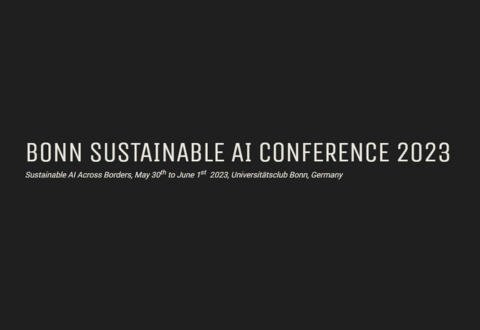
The second Sustainable AI conference – Sustainable AI Across Borders – organized by the Bonn Sustainable AI lab at Bonn University’s Institute for Science and Ethics (IWE) will take place May 30th to June 1st 2023. The focus of the first conference in June 2021 was to create a community of researchers in the space of Sustainable AI and to raise awareness on the topic. The second conference will focus on cross cultural perspectives to address the variety and scope of ethical issues on a global scale. An inspiration for this theme is to acknowledge the reality that certain countries play an integral role in the early production phase and the waste management but may never experience the benefits of AI.
Keynote Speakers
To see full program click here
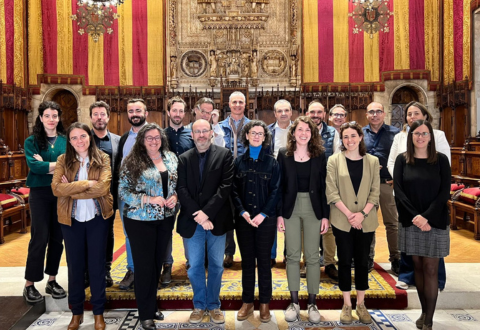
The city of Barcelona has established an external consultative body made up of 15 independent experts who will advise the City Council on the use of artificial intelligence for the common good.
Besides advising the municipal government on the use of AI, the body’s main task will be to carry out studies and evaluate the impact of high-risk algorithms on citizens’ fundamental rights before implemention, assessing possible undesirable effects and introducing any necessary measures to correct them. Especially in sensitive areas such as education, employment or essential public services. Its mission will be to assure that the push for innovative public policies guarantees citizens’ digital rights at all times.
The council will also promote collaboration with universities, research centers, companies and other entities related to this area. It will also propose projects to make Barcelona a reference city for technological humanism.
The experts that constitute the body work in different research institutions and count on expertise drawn from the academic field, both from scientific and technological disciplines as well as from social sciences and humanities, all with previous experience on ethics and AI. The experts will be part of the body for five years, extendable for a maximum of one more term, and will meet at least twice a year. Working groups will also be set up for topics of interest.

CIDOB’s Global Cities Programme and Urban AI co-organise the “Mapping Urban AI” webinar series, with the support of the Cities Coalition for Digital Rights and Barcelona City Council, and within the framework of the Global Observatory of Urban AI. The five-episode series aims at highlighting how cities design, use, and implement Urban Artificial Intelligence throughout the globe. For a period of six weeks, every session will host representatives from global cities who will showcase their specific use cases and policies on how they implement urban AI.
PROGRAM
March 7th – Holistic Strategies for Urban AI (16-17h)
From specific projects to holistic strategies, what is the value of having an AI strategy? How can cities create overarching ethical frameworks to promote a rich and coherent development of urban AI? What are the key ingredients of successful AI strategies? How can cities govern AI? This session will feature two pioneer cities with experience on the matter. With Paula Boet (Project Manager at Barcelona City Council) and Alex Foard (Executive Director, Research and Collaboration, NYC Office of Technology and Innovation).
March 14th – AI for Urban Health (16-17h)
Can AI be used by cities to improve urban health? In this session we will explore how the City of Buenos Aires used AI to better combat COVID 19
March 21st – Urban AI: Enabling Safe and Inclusive Cities in Africa (16-17h)
Africa is home to some of the fastest-growing cities in the world, and with this growth comes significant challenges in terms of housing, transportation, and access to essential services. At the same time, rapid advancements in AI technology are offering new possibilities for addressing these challenges and creating more just and equitable urban environments. This event aims to explore the intersection of AI and urban planning in Africa, highlighting innovative strategies and solutions for leveraging AI to promote social equity and create more sustainable, liveable cities. With Sophie Naue (Urban Innovation Specialist at UN Innovation Technology Accelerator for Cities).
March 28th – Urban AI and Sustainable Cities (16-17h)
SDG Goal 11 is about making cities and human settlements inclusive, safe, resilient and sustainable. To achieve this global goal, cities are innovating using new technologies such as AI in different ways. This first episode on urban AI for sustainability purposes will feature two researchers from the Barcelona Supercomputing Center – Elli Kartsakli (Established Researcher, Computer Sciences – Predictable Parallel Computing Department) and Jan Mateu (Recognised Researcher, Earth Sciences – Air Quality Services ES group Department) – who will explain how AI can be used to monitor traffic-related air quality to benefit present and future generations. With Elli Kartsakli (Established Researcher, Computer Sciences – Predictable Parallel Computing Department) and Jan Mateu (Recognised Researcher, Earth Sciences – Air Quality Services ES group Department).
April 11th – AI for Low Carbon Cities (16-17h)
As cities around the world strive to reduce their carbon footprint and mitigate the effects of climate change, AI has emerged as a powerful tool for achieving these goals. This event will explore how two municipalities are deploying urban AI to reduce their greenhouse gas emissions and become low carbon cities through mobility and energy solutions. With Rautio Pasi (Project Manager at the City of Helsinki) and Laurent Duthoit (CIO at the City of Meudon, Greater Paris).

UN-Habitat has launched a global survey to better understand the needs of local governments in relation to artificial intelligence (AI). The survey aims to identify current capacity and governance gaps, as well as opportunities for standardization, cooperation, and multi-stakeholder governance in cities related to the responsible use of AI. This survey is carried out collaboration with United Nations University Operating Unit on Policy-Driven Electronic Governance (UNU-EGOV), a policy-oriented think tank dedicated to electronic governance, and with the support of Canada’s International Development Research Centre (IDRC). The survey is expected to generate valuable insights into the needs and capacities of cities to use AI responsibly. The results will help the United Nations and other organizations to understand local government priorities and AI capacity needs in addition to informing the development of technical guidelines on how to use, implement, and govern AI in local government contexts.

The Barcelona City Council approved the “Definition of work methodologies and protocols for implementing algorithmic systems”, which creates an internal protocol for the ethical implementation of algorithmic systems used by the municipality. The protocol, based on the proposed European AI regulation, defines step-by-step mechanisms for each stage of the process, from the public tendering and implementation phase to the dismantling of the AI system. The procedure adapts to the different stages of the AI lifecycle and its level of riskiness (assessed from ‘limited and minimal risk’ to ‘unacceptable risk’ based on the EU Commission’s risk classification). According to this classification, algorithmic systems with unacceptable risk are automatically rejected, while high-risk systems must undergo an algorithmic impact study produced by an external consultant. Furthermore, it also establishes governance and supervision bodies that will ensure that the impact of AI is in line with the ethical principles endorsed by Barcelona’s AI strategy. This is a pioneering document in regard to the regulation and governance of algorithmic systems at the local level, as it combines public procurement, the lifecycle of an algorithmic system, the City Council’s data protection mechanisms and the ethical standards defined by various administrations and organisations of the city.

The Algorithmic Transparency Standard developed by Eurocities’ Digital Forum Lab in collaboration with nine cities – Barcelona, Bologna, Brussels, Eindhoven, Mannheim, Rotterdam and Sofia – is based on work done by Helsinki and Amsterdam, the first cities to launch algorithm registers.

Work is underway by cities supported by the EU Commission to develop EU standard contractual clauses for the procurement of ethical AI based on the good practices of the City of Amsterdam. Amsterdam developed a set of contractual clauses for the procurement of Artificial Intelligence, to create a framework for the information that suppliers need to provide on algorithms used in order to ensure citizen trust in these services and so that the city could provide transparent information on how AI is used. The city made its contractual clauses publicly available as a template for other cities and other governments to reuse, as a practical means of encouraging the use of AI while providing safeguards.
These clauses are being reviewed and adapted to ensure they are aligned with the AI Act which is still under negotiation. The work will be supported by a community of practice, DG GROW’s forthcoming Digital Public Buyer’s Community, and the Living-in.EU movement (DG CONNECT).